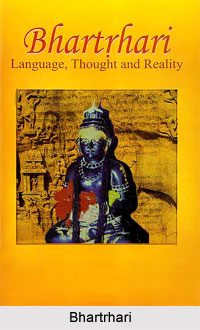 Bhartrihari (430-80 CE) was a Sanskrit grammarian who taught an edition of philosophical monism. He lived in the century preceding the Christian era. Bhartrihari was the step brother of Chandra Gupta Vikramaditya. Bhartrihari was the king of Malwa whose capital was the city of Ujjain. He had renounced worldly life and followed a spiritual life.
Bhartrihari (430-80 CE) was a Sanskrit grammarian who taught an edition of philosophical monism. He lived in the century preceding the Christian era. Bhartrihari was the step brother of Chandra Gupta Vikramaditya. Bhartrihari was the king of Malwa whose capital was the city of Ujjain. He had renounced worldly life and followed a spiritual life.
Bhartrihari identified absolute reality as the undifferentiated essence of language and meaning. The Absolute acts through its principal autonomous power called time. Language and consciousness are always together, language being the creative `vibration` in all awareness. Every process of thought is saturated by words according to Bhartrihari. Bhartrihari`s Satakas or centuries of verses are also much admired. Bhartrihari appears more as a worshipper of Lord Shiva in his work. Bhartrihari`s Vakyapiadiya is considered as the last independent contribution to Indian grammatical science. Bhartrihari was became a Buddhist in his old age.
Writing Style of Bhartrihari
His basic insight in his theory of language is that the sentence is the basic linguistic fact and that individual words are abstractions of grammarians. Sentences and contexts are the vehicles of a language. Metaphysical and linguistic evolution is divided into three stages. These works of Bhartrihari are often cited under the name of Harikarika.
Works of Bhartrihari have great philosophical significance, especially with regard to the connections they have with grammar, logic, semantics and ontology. Language is the fundamentally ontological principle that accounts for how one is able to conceptualize and communicate the awareness of objects. Most of his poetic compositions contain instances from his life, written in a manner to serve as a spiritual guide to those who read it. Bhartrihari`s views on language was based on that of earlier grammarians like Patanjali. The notion of sphota is a key element of his conception of language.
Bhartrihari`s poetry exhibits Sanskrit language in its best. However his epics lack life and accomplishment. The characters are stereotyped and their descriptions are admirable as well as given in detail. Some have a tendency to be over-elaborating thereby losing force. Each stanza can stand by itself and serves to express one idea in complete and elegant form.
The predominant metres employed by Bhartrihari are the €ardulavikridita, €ikharini, the €loka, the Vasantatilaka; the Sragdhara and the Arya. Other intermittent metres used are Indravajra type, Malini, Harinl, Mandakranta, Prthvi, Drutavilambita, Van‡astha, Calini; Ratthoddhata and Vaitaliya, Dodhaka, Puspitagra, and Matrasamaka.



















